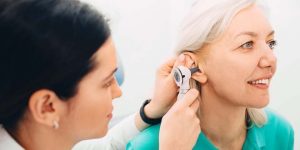It’s important to look after your hearing. Read on to learn about seven tips for hearing health.
1. Protect your hearing
Decibels (dBA) measure the intensity of sound. The safest level of sound for noise exposure is less than 85 dBA. Anything above 85 dBA may require hearing protection to avoid potential hearing loss from the continual exposure over time. The chart below shows the maximum recommended noise levels that the average person may be exposed to on a daily basis.
| Noise source | Sound level | Time allowed |
| Airboat | 108 dBA | 2 minutes |
| Band saw | 108 dBA | 2 minutes |
| Chain saw | 110 dBA | 1.5 minutes |
| Fire alarm | 95 dBA | 48 minutes |
| Front end loader | 95 dBA | 48 minutes |
| Hedge trimmer | 103 dBA | 7.5 minutes |
| Piano | 103 dBA | 7.5 minutes |
| Pressure washer | 100 dBA | 15 minutes |
| Riding lawn mower | 90 dBA | 2 hours, 30 minutes |
| Tractor | 92 dBA | 1 hour, 35 minutes |
| Trombone | 114 dBA | 1 minute |
| Vacuum cleaner | 97 dBA | 5 hours |
| Violin | 92 dBA | 1 hour, 35 minutes |
Hearing health professionals believe that more than 40% of all hearing loss can be prevented by taking a few simple precautions:
- Wear hearing protection, such as custom ear plugs
- When attending a concert, choose outdoor venues when possible
- When attending an indoor concert, wear ear plugs
- Turn the volume down on your electronic and mobile devices
2. Practice appropriate hygiene for your ears
Generally, your ears are self-cleaning, so no routine maintenance is generally required other than washing them regularly with soap and water, using a soft cloth. Never use cotton swabs, bobby pins or sharp pointed objects to clean your ears. These objects may injure the ear canal or eardrum.
Ear wax is produced within the ear canal and naturally migrates from deeper inside to outside. However, some people produce more than the average amount of ear wax, and others (especially older adults) can have a buildup of ear wax that is hard and dry. This buildup can muffle sound. Even in these situations, inserting a cotton swab inside the ear is never recommended, as it will only push wax deeper into your ear canal.
If you have a buildup of ear wax, be sure to see a hearing care professional or your family doctor to have it removed. They can ensure that it will be done safely and effectively.
3. Keep diabetes and other medical conditions well-controlled
Certain chronic diseases that aren’t directly related to your ears can cause hearing loss. In some cases, blood flow to the inner ear or brain is interrupted. In others, hearing loss is caused by nerve damage. Medical conditions that are associated with hearing loss include:
- Diabetes
- Heart disease
- High blood pressure
- Stroke
- Autoimmune diseases, such as rheumatoid arthritis
4. Review your medications to ensure that they are not contributing to hearing loss
A number of drugs can damage hearing. Sometimes the effects are short-term, while others are longer lasting. If you take a prescription medication, check with your doctor to understand if the medication may affect your hearing.
Some medications that are known to contribute to hearing loss include:
- Aspirin (in high doses)
- Antibiotics
- Anti-cancer chemotherapy drugs
- Anti-malaria drugs
- Erectile dysfunction drugs
- Loop diuretics, which are used to treat high blood pressure
5. Quit smoking
Recent research has shown that smoking can cause hearing loss. In fact, people who smoke have a 70% greater chance of developing hearing loss, compared with non-smokers. The more people smoked, the greater their risk of hearing loss. The good news is that the risk of hearing loss associated with smoking declines within five years after a person quits smoking.
Some of the reasons why smoking contributes to hearing loss include:
Damage to the eustachian tube. Your eustachian tube runs from your middle ear to the back of your throat. It equalizes the pressure in your ears and drains the mucous created by the lining of your middle ear. Smoking leads to blockages in the eustachian tube, causing pressure buildup and hearing loss.
High blood pressure. Smoking can cause your blood pressure levels to rise. The structures in your inner ear depend on good, sturdy blood flow. When your blood pressure changes, your inner ear has difficulty processing sounds.
6. Have your hearing checked on a regular basis, even if you don’t have hearing loss
It is wise to have a regular hearing test with a hearing care professional, even if you have no current concerns about your hearing. This is especially important for the following populations:
- People over 50 years of age
- People who work in noisy environments
- People who live with diabetes or other health-related condition
Getting a routine hearing test to identify hearing loss in its early stages is important for prevention. Not only is hearing loss associated with some mood and brain function issues, it is also more common with increasing age. This is due to such factors as long-term noise exposure; also, as people age, they’re more prone to chronic conditions such as high blood pressure or diabetes, which are associated with hearing loss. In addition, it can be easy to miss subtle signs of hearing loss: many people with gradual, age-related hearing loss often don’t realize they have it.
7. See a hearing care professional at the first signs of hearing loss
Make an appointment with a hearing care professional to have your hearing tested if you:
- Have trouble hearing conversations
- Are around loud noises on a regular basis
- Often hear ringing in your ears
- Have close relatives with hearing loss
Early diagnosis and management of hearing loss is important as it may help to reduce additional hearing loss in the future.
Following these 7 tips could help you maintain your hearing health and prevent or delay hearing loss. Reducing your exposure to loud noises, practicing appropriate ear hygiene, and having regular hearing tests can all help ensure that you protect your hearing health.
If you suspect that you have hearing loss, contact a hearing care professional at Lifestyle Hearing for a screening test. If you would like to receive monthly hearing care updates, you can sign up here for the Gazette.
 Diabetes Care Community Learn, connect and care
Diabetes Care Community Learn, connect and care





